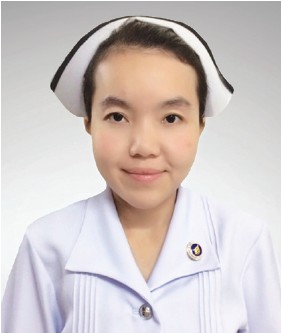Effects of a Self-Efficacy Promoting Program on Village Health Volunteers’ Knowledge and Perceived Self-Efficacy for Dementia Screening in Older Persons: A Case Study at Sakon Nakhon Province
Main Article Content
Abstract
OBJECTIVES: To study the effects of self-efficacy promoting program on village health volunteers’ (VHVs) knowledge and perceived self-efficacy for dementia screening in older adults.
MATERIALS AND METHODS: In this quasi-experimental study, two group pre-test and post-test design were used to study sixty VHVs who fulfilled the inclusion criteria. These were randomly divided into two groups: an experimental group (n = 30) receiving the self-efficacy promoting program for a 4-week period and a control group (n = 30) receiving the routine program. Data were collected using a demographics questionnaire, a dementia knowledge questionnaire, and a perceived self-efficacy for dementia screening in older adults’ questionnaire. Data were analyzed using descriptive statistics, Chi-square test, paired t-test, independent t-test, Wilcoxon signed ranks test and Mann Whitney U test.
RESULTS: After participating in the self-efficacy promoting program the experimental group had significantly higher mean scores of dementia knowledge and perceived self-efficacy for dementia screening in older adults than before receiving the program when compared to the control group (p < 0.001, p < 0.001, respectively).
CONCLUSION: The self-efficacy promoting program is useful for developing the competency of VHVs in similar communities in order to assist nurses in monitoring and caring for dementia in older adults.
Article Details
This is an open access article distributed under the terms of the Creative Commons Attribution Licence, which permits unrestricted use, distribution, and reproduction in any medium, provided the original work is properly cited.
References
2. Chansirikanchana S. Knowledge about dementia, 2014.(Accessed November 22, 2014, at http://rxrama.com/article003.html). (in Thai)
3. Akepolakorn W. Thai Health Examination by the 5th PhysicalExamination,2014.(Accessed September 28, 2014, at http://kb.hsri.or.th/dspace/ handle/11228/4626).(in Thai)
4. Chansirikanchana S. Dementia Situation: A brainstormingsession to develop a policy to prevent, treat and care dementiain Thailand. Nonthaburi: The graphic systems co., ltd.; 2012.(in Thai)
5. McCabe M, You E,TatangeloG. Hearing Their Voice: ASystematic Review of Dementia Family Caregivers’ Needs.Gerontologist 2016; 56: 70-88.
6. The World Alzheimer Report. World Alzheimer Report 2015:The Global Impact of Dementia, 2015.(Accessed November21, 2015, at https://www.alz.co.uk/research/worldreport-2015)
7. Rungruang K, Kanjanasilp J, Ploylearmsang C, et al.Pharmaceutical Care in Outpatients with Dementia at NakhonRatchasima Rajanagarinda Psychiatric Hospital. IJPS (Thai)2011;7:62-75.
8. Alzheimer’s Disease International. Dementia in theCaribbean: No time to lose, 2018. (Accessed May 1, 2018,athttps://www.alz.co.uk/news/dementia-in-caribbean-no-timeto-lose)
9. World Health Organization. Global action plan on the publichealth response to dementia 2017–2025, 2018. (AccessedApril 5, 2018, at http://www.who.int/mental_health /neurology/dementia/action_plan_2017_2025/en/)
10. Ministry of Social Development and Human Security.National Plan for Elderly People, Vol. 2 (2002-2021), 1strevised edition, 2009, 2016.(Accessed March 1, 2016, at http://www.dop.go.th/download/laws/law_ th_20152309144546_1.pdf). (in Thai)
11. AnuntaP,Tonganake J,The effectiveness of home visit andtraining program in village health volunteers in Khwao, Selaphum,RoiEt. 2012. J Office ODPC 6KhonKaen (Thai)2013;20:1-8.
12. Sangjune S, Yunak R, Tangkawanich T. The effect of villagehealth volunteers’ potentiality development program toprovide patients palliative. J Nurs Health Scien (Thai)2015;9:68-77.
13. Tejativaddhana P, Kitreerawutiwong N. Effectiveness of aTraining Program for the Village Health Volunteers in ProvidingCommunity Care for Patients with Cerebrovascular DiseaseUsing the Context-Based Learning (CBL) J Nurs Health Care(Thai) 2014;32:87.
14. Noguchi M, Iwase T, Suzuki E,KishimotoY,Takao S. Erratumto: Social support and suicidal ideation in Japan: are homevisits by commissioned welfare volunteers associated with alower risk of suicidal ideation among elderly people in thecommunity? Social Psychiatry and Psychiatric EpidemiologyJournal. 2015;50:505-6.
15. Burbeck R, Candy B, Low J, et al. Understanding the role ofthe volunteer in specialist palliative care: a systematic reviewand thematic synthesis of qualitative studies. BMC PalliatCare 2014;13(1):3.
16. Chuengsatiansup K, Suksut P.Health Volunteers in the Contextof Change : Potential and Developmental Strategies. J HealthSys Research (Thai) 2007;1:268-79.
17. Phinyo P, Phinyo K, Janhauna S. The effectiveness of selfefficacyenhancement program on knowledge, attitudes andbehaviors of the village health volunteers providing the longterm care for the elders, KhonKaen province. SongklanagarindJ Nurs (Thai) 2017;37:109-20.
18. Bandura A.Self-efficacy: the exercise of control. New York:W.H. Freeman and Company, 1997.
19. Pfeiffer, E. A short portable mental status questionnaire forthe assessment of organic brain deficit in elderly patients.J Am Geriatr Soc 1975;23(10):433-41.
20. Erdfelder E, Faul F, Buchner A. G POWER: A general poweranalysis program. Behav Res Meth Instrum Comput 1996;28(1): 1-11.
21. Pengsa-ium V, Chaiyasung P, Yakasem P. Outcome ofempowerment program on perceived empowerment andcaregiving practice of health volunteers to dementia ofelderly. J Nurs Educ (Thai) 2015; 8:152-65.
22. Alzheimer’s and Related Disorders Association of Thailand.Dementia assessment, 2015. (Accessed January 5, 2015, athttp://www.thaimemorytest.com)
23. Prombutr P, Sookpool A, PhinyoK,Phinyo P. The effect ofself-efficacy program toward knowledge and self-efficacy ofvillage health volunteers in diabetic and hypertension patientcare in community in northeast province. SongklanagarindJ Nurs (Thai) 2015;35:113-28.
24. Simsiriwat W, Junprasert S, Krungkraipetch N. Effects ofSelf-Efficacy Promotion on Knowledge, Perceived Self-Efficacyand Promoting Thalassemia Control Behavior among BangkokHealth Volunteers. J Nurs Burapha (Thai) 2017;25:94-104.


